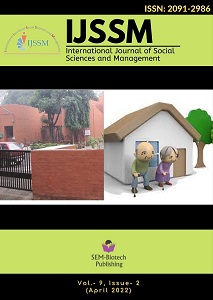Roles of Mass Media in Shaping Knowledge and Perception Related to Covid-19
DOI:
https://doi.org/10.3126/ijssm.v9i2.42995Keywords:
mass media, roles, COVID-19, knowledge, perceptionAbstract
Background: COVID-19 is an emerging disease that has been creating global havoc. Since it was a newly emerged disease, only a little information was known at the initial phase. Later, correct information and prevention measures were provided throughout the globe via a different outlet, but the prevailing myths and misconceptions still followed.
Objective: To assess the role of mass media on knowledge and perception related to COVID-19 among the students.
Methodology: A descriptive cross-sectional study was conducted to identify the role of mass media in shaping the knowledge and perception related to COVID-19 among the students of Bharatpur, Chitwan. Samples were selected by using a stratified random sampling method and data was collected by using self-administered structured questionnaires and IBM SPSS was used for analysis in descriptive and inferential statistics.
Results: Out of the 103 respondents, 13.6% were male and 86.5% were females, 86.4 % were age more than 23years. Among which, 88.8% used mass media for obtaining information where 67.3% used it daily and the most preferable media was social media (70.4%). Similarly, 74.8% of respondents had fair knowledge, (15.5%) respondents had good knowledge, and 97.1% of the respondents had a positive perception regarding Covid-19. Respondent’s most preferable media (social media) was significantly associated with the level of knowledge of the respondents (p=0.047).
Conclusion: The study concludes that the respondents had positive perceptions, but the knowledge level was more fair knowledge and very limited good knowledge, which signifies that there is still a need for awareness programs, campaigns, and other educational interventions.
Int. J. Soc. Sc. Manage. Vol. 9, Issue-2: 75-82.
Downloads
Downloads
Published
How to Cite
Issue
Section
License
Copyright (c) 2022 International Journal of Social Sciences and Management

This work is licensed under a Creative Commons Attribution-NonCommercial 4.0 International License.
This license enables reusers to distribute, remix, adapt, and build upon the material in any medium or format for noncommercial purposes only, and only so long as attribution is given to the creator.




